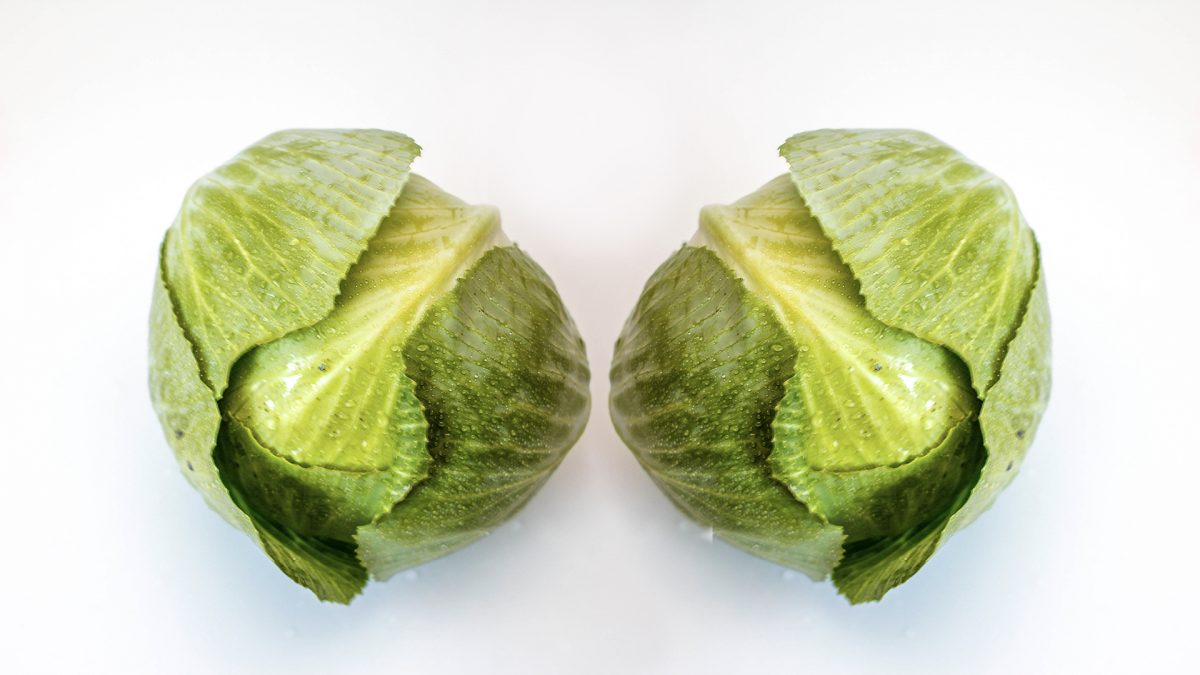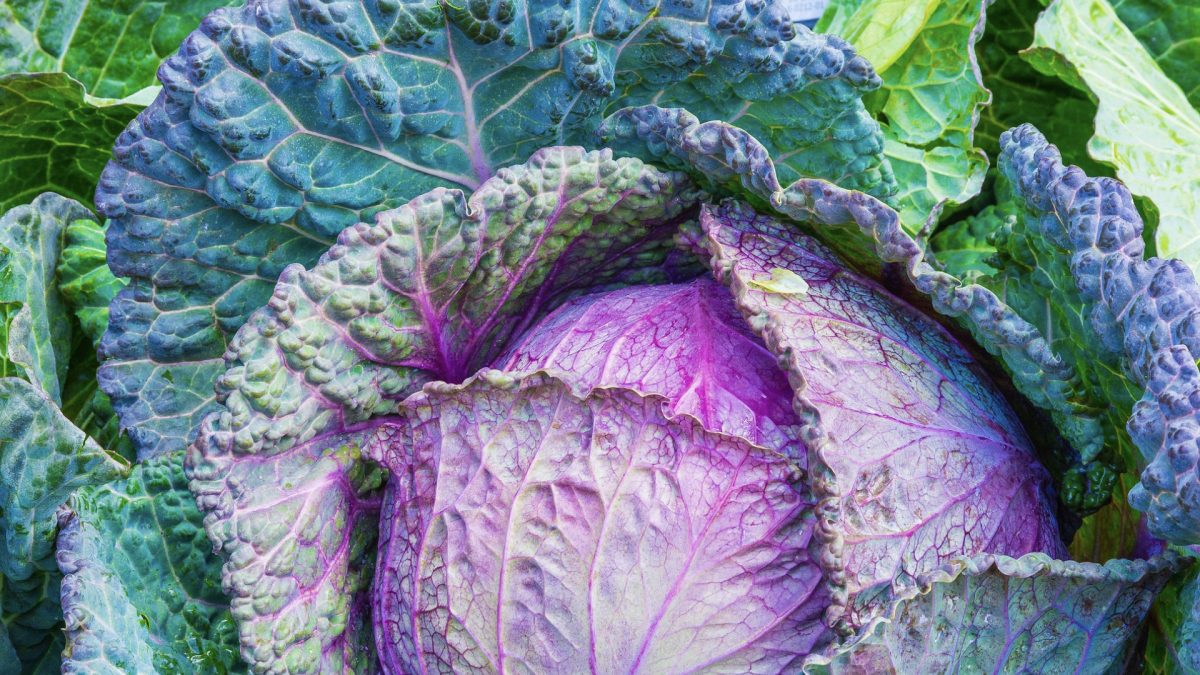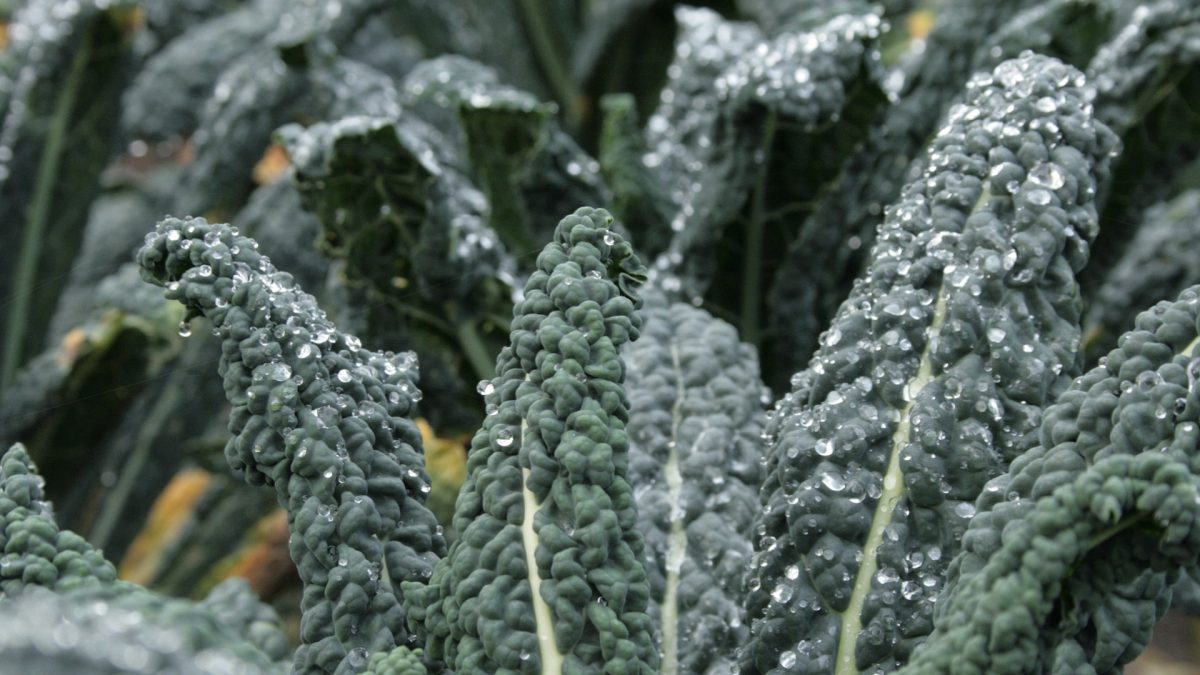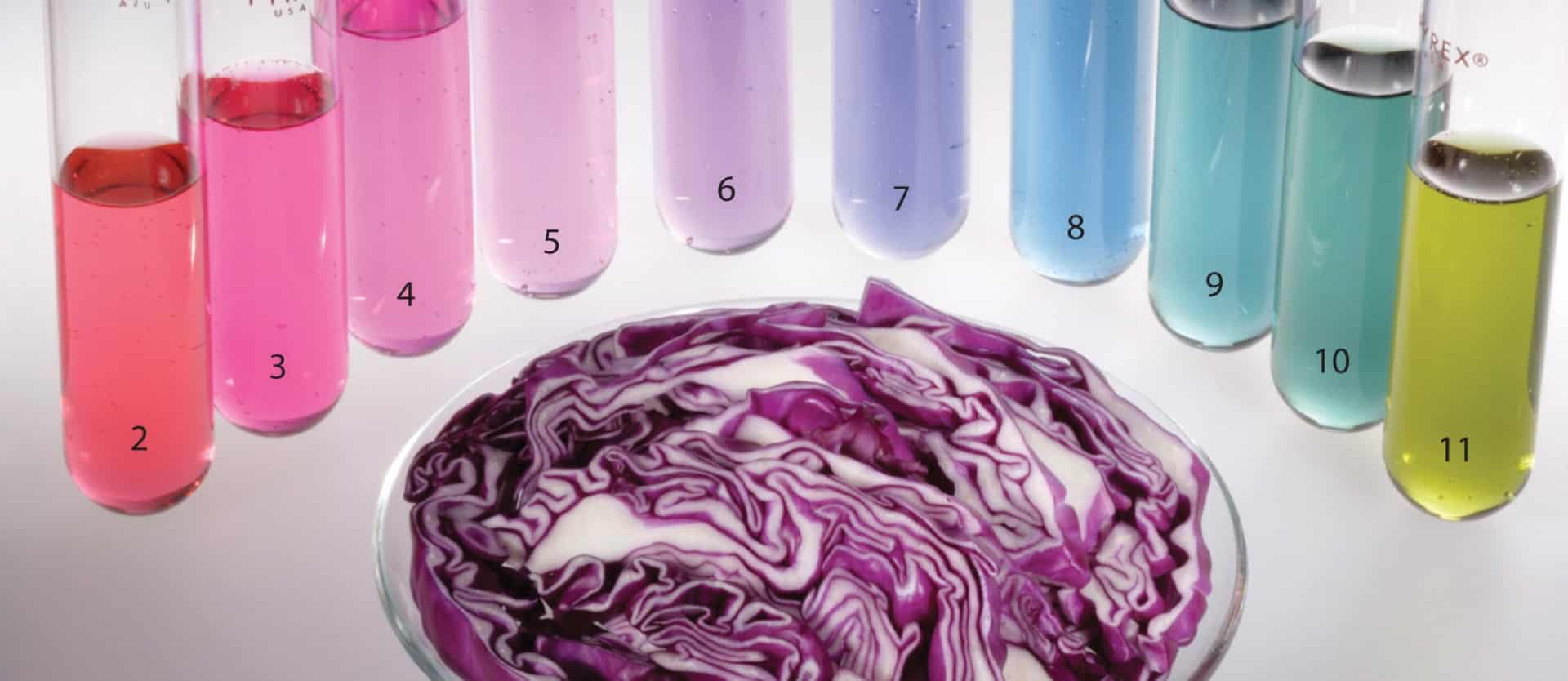
Cabbage
Cabbage and other cruciferous vegetables, such as broccoli, cauliflower, kale, collard greens, watercress, bok choy, arugula, radishes (including horseradish), and brussels sprouts, can potentially prevent DNA damage and metastatic cancer spread, activate defenses against pathogens and pollutants, help to prevent lymphoma, boost your liver detox enzymes, target breast cancer stem cells, and reduce the risk of prostate cancer progression. The component responsible for these benefits is thought to be sulforaphane, which is formed almost exclusively in cruciferous vegetables.
Beyond being a promising anticancer agent, sulforaphane may also help protect your brain and your eyesight, reduce nasal allergy inflammation, manage type 2 diabetes, and was recently found to successfully help treat autism.
For all these reasons, cruciferous vegetables get their own spot on my Daily Dozen, which recommends at least one serving of cruciferous vegetables and at least two additional servings of other vegetables a day, cruciferous or otherwise.
Indeed, if you were to add only one thing to your diet, consider cruciferous vegetables. Less than a single serving a day of broccoli, brussels sprouts, cabbage, cauliflower, or kale may cut the risk of cancer progression by more than half.
Does it matter what kind of cabbage? Colorful foods are often healthier because they contain antioxidant pigments, whether it’s the beta-carotene that makes carrots and sweet potatoes orange, the lycopene antioxidant pigment that makes tomatoes red, or the anthocyanin pigments that make blueberries blue. The colors are the antioxidants. Red cabbage may contain eight times more antioxidants than green, for example. In fact, purple, or red, cabbage provides one of the single best nutritional bangs for your buck, so go for the brightest, deepest colors of cabbage.
For substantiation of any statements of fact from the peer-reviewed medical literature, please see the associated videos below.
Image Credit: Wikimedia Commons. This image has been modified.
Popular Videos for Cabbage


Benefits of Cabbage Leaves on the Knee for Osteoarthritis
Unbelievably, a randomized controlled trial of cabbage leaf wraps for arthritis was published.
The Benefits of Kale and Cabbage for Cholesterol
Dinosaur kale and red cabbage are put to the test.
Testing Your Diet with Pee and Purple Cabbage
Plant-based diets tend to be alkaline-forming. This may help protect muscle mass, and reduce the...All Videos for Cabbage
-

Natural Ozempic Alternatives: Boosting GLP-1 with Diet and Lifestyle
Certain spices and the quinine in tonic water can boost GLP-1, but at what cost?
-

Banana vs. Mango Smoothies for Polyphenol Absorption
How can you mediate the phytonutrient-destroying enzyme in avocados, bananas, and mushrooms?
-

The Benefits of Moringa: Is It the Most Nutritious Food?
Does the so-called miracle tree live up to the hype?
-

How to Boost Brain BDNF Levels for Depression Treatment
Fasting and exercise can raise BDNF levels in our brain, but this can also be achieved by eating and avoiding certain foods.
-

Evidence-Based Weight Loss – Live Presentation
In this live presentation, Dr. Greger offers a sneak peek into his book How Not to Diet.
-

How to Cook Greens
Dark green leafy vegetables are the most nutrient-dense foods on the planet. What’s the best way to prepare them?
-

Dr. Greger on Live with Kelly and Ryan
Watch my JanYOUary 2018 segment on Live with Kelly and Ryan.
-

Best Brain Foods: Berries and Nuts Put to the Test
Randomized controlled studies put nuts, berries, and grape juice to the test for cognitive function.
-

Benefits of Cabbage Leaves for Relief of Engorged Breasts
Cabbage is put to the test in a randomized controlled trial.
-

Benefits of Cabbage Leaves on the Knee for Osteoarthritis
Unbelievably, a randomized controlled trial of cabbage leaf wraps for arthritis was published.
-

The Benefits of Kale and Cabbage for Cholesterol
Dinosaur kale and red cabbage are put to the test.
-

Dr. Greger’s Daily Dozen Checklist
In my book How Not to Die, I center my recommendations around a Daily Dozen checklist of everything I try to fit into my daily routine.
-

Culture Shock – Questioning the Efficacy and Safety of Probiotics
In certain medical conditions, probiotic supplements may actually make things worse.
-

The Best Diet for Fibroids
The same diet that helps regulate hormones in women may also reduce exposure to endocrine-disrupting pollutants.
-

Fighting Autism Brain Inflammation with Food
One food may be able to combat all four purported causal factors of autism: synaptic dysfunction, oxidative stress, mitochondrial dysfunction, and neuroinflammation.
-

Fever Benefits for Autism in a Food
Dramatic improvements in autistic children when they have a fever suggest that the disease may be reversible if one can replicate the phenomenon in other ways.
-

Dr. Greger’s Daily Dozen Checklist
In my book How Not to Die, I center my recommendations around a Daily Dozen checklist of all the things I try to fit into my daily routine.
-

Is Nutritional Yeast Healthy for Everyone?
Those with certain autoimmune diseases such as Crohn’s disease should probably not eat nutritional yeast.
-

Best Food to Counter the Effects of Air Pollution
There is a food that offers the best of both worlds—significantly improving our ability to detox carcinogens like diesel fumes and decreasing inflammation in our airways—all while improving our respiratory defenses against infections.
-

Benefits of Marjoram for Polycystic Ovary Syndrome (PCOS)
Even a small amount of fresh herbs can double or even quadruple the antioxidant power of a meal. The abilities of oregano to decrease chromosomal damage from radiation and marjoram to affect hormone levels in women with PCOS are put to the test.
-

How to Prevent Non-Alcoholic Fatty Liver Disease
Avoid sugary and cholesterol-laden foods to reduce the risk of our most common cause of chronic liver disease.
-

Brown, Black, Purple, and Red Unlike White on Rice
White rice is missing more than fiber, vitamins, and minerals. Phytonutrients such as gamma oryzanol in brown rice may help explain the clinical benefits, and naturally pigmented rice varieties may be even healthier.
-

Specific Receptors for Specific Fruits and Vegetables
Dietary diversity is important because each plant family has a unique combination of phytonutrients that may bind to specific proteins within our body.
-

Bowel Wars: Hydrogen Sulfide vs. Butyrate
Sulfur dioxide preservatives in dried fruit, sulfites in wine, and the putrefaction of undigested animal protein in the colon can release hydrogen sulfide, the rotten egg gas associated with inflammatory bowel disease.
-

Stool pH & Colon Cancer
Fermentation of fiber in the gut may help explain the dramatic differences in colorectal cancer incidence around the world.
-

Second Strategy to Cooking Broccoli
Adding myrosinase enzymes in the form of even a pinch of mustard powder to cooked cruciferous (cabbage-family) vegetables like kale, collards or Brussels sprouts can offer anti-cancer sulforaphane levels comparable to raw, removing the necessity to pre-chop for maximum health benefits.
-

Which Vegetable Binds Bile Best?
Which foods are best at removing carcinogenic bile acids from the body: asparagus, beets, broccoli, cabbage, carrots, cauliflower, collards, eggplant, green beans, kale, mustard greens, okra, or peppers? And do they work better raw or cooked?
-

Cancer Risk from French Fries
The association between cancer and the consumption of deep-fried foods may be due to carcinogens formed at high temperatures in animal foods (heterocyclic amines and polycyclic hydrocarbons) and plant foods (acrylamide).
-

Caloric Restriction vs. Animal-Protein Restriction
The lifespan extension associated with dietary restriction may be due less to a reduction in calories, and more to a reduction in animal protein (particularly the amino acid leucine, which may accelerate aging via the enzyme TOR).
-

Dietary Treatment of Glaucoma
Blueberries may help protect against age-related macular degeneration, and black currants may help halt the progression of glaucoma.
-

The Broccoli Receptor: Our First Line of Defense
There is a receptor in our intestines activated by phytonutrients in cruciferous vegetables that boosts immune function (the aryl hydrocarbon [Ah] receptor).
-

Testing Your Diet with Pee and Purple Cabbage
Plant-based diets tend to be alkaline-forming. This may help protect muscle mass, and reduce the risk of gout and kidney stones. The pH of one’s urine can be estimated with natural pigments, using kitchen chemistry.
-

Breast Cancer Survival Vegetable
Simple changes in diet and lifestyle may quadruple a woman’s survival rate from breast cancer.
-

Prostate Cancer Survival: The A/V Ratio
Reducing the ratio of animal to plant protein in men’s diets may slow the progression of prostate cancer.
-

Update on Cinnamon for Blood Sugar Control
Cinnamon can no longer be considered a safe and effective treatment for diabetes.
-

Preventing Breast Cancer by Any Greens Necessary
Which was associated with lowest breast cancer risk in African-American women? Apples, bananas, broccoli, cabbage, cantaloupe, carrots, collard greens, grapefruit, oranges, spinach, tomatoes, or sweet potatoes?
-

Plant-Based Diets and Cellular Stress Defenses
Measuring the effects of a plant-based diet on the expression of hundreds of different genes at a time, a research group found that an antioxidant-rich portfolio of plant foods such as berries, pomegranates, purple grapes, red cabbage, oregano, and walnuts was able to significantly modify the regulation of genes in the blood of volunteers.
-

Apples and Oranges: Dietary Diversity
In addition to quantity and quality, the variety of fruits and vegetables consumed matters, as many phytonutrients are not evenly distributed among the various families and parts of plants.
-

Biggest Nutrition Bang for Your Buck
Growing your own broccoli sprouts is one of the most cost-effective ways to improve your diet.
-

Anti Up on the Veggies
Greens rank highest in chemical antioxidant assays (such as ORAC, TEAC, TRAP, and FRAP). But which vegetables lead the pack when cellular antioxidant activity is measured?
